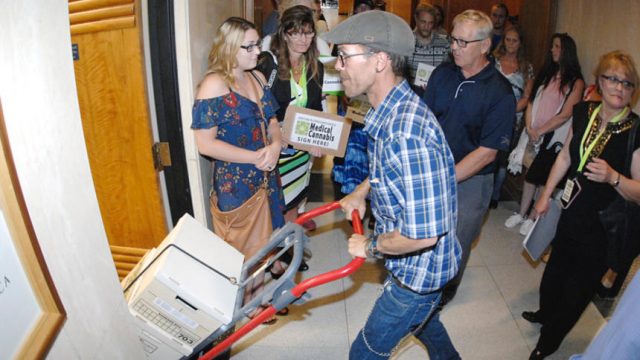It’s Not Constitutional to Ban Out of State Money for Initiated Measures

Brandon Muhs, front, of Fargo, North Dakota, pushes a dolly cart with boxes containing petition signatures into the Secretary of State's office on 7-11-2016 for a medical marijuana initiative for consideration on the November ballot. Initiative committee chairman Rilie Ray Morgan, second from right, and his wife, Rita, far right, also of Fargo, were among a group of supporters gathering at the state Capitol in Bismarck, North Dakota.
A committee convened by the Legislature to review the initiated measure process met this week, and it seems they’re taking a long and hard look at the amount of money from outside the state which has funded some recent measures.
The obvious example is the Marsy’s Law ballot measure, a horrible idea ramrodded through the election over the objections of North Dakota’s legal community by millions from California billionaire Henry Nicholas. The law, named for his sister, is his pet project and he managed to buy it into the state constitution.
But the problem wasn’t that Nicholas spent a lot of money on his hobby horse. Money is speech. Nicholas, along with every other American, should be allowed to spend their personal wealth in pursuit of whatever political agendas they wish. In fact, trying to curtail out of state spending on initiated measures would almost certainly be found unconstitutional by the courts, and rightfully so.
Money is speech. Our political candidates – notably incumbent Senator Heidi Heitkamp this election cycle – regularly get most of their money from out of state. That’s something we should be aware of. We should all know where the money is coming from. But it shouldn’t be restricted.
[mks_pullquote align=”right” width=”300″ size=”24″ bg_color=”#ffffff” txt_color=”#000000″]We don’t need to curtail money for initiated measures. We need to curtail initiated measures.[/mks_pullquote]
The problem represented by Marsy’s Law isn’t the money. It’s that the initiated measure process is a terrible way to make public policy in the first place.
Many of the initiated measures are quite complicated. Marsy’s Law, in particular, added pages of new policy to our state constitution. Given how crowded our ballots are with national, state, and local elections can we really expect that voters are carefully considering the ramifications of the complicated legislation they’re voting for? Or against, for that matter?
Remember that once a measure passes – whether it amends the state constitution or statute – it’s extremely difficult to fix. Look at the policy abomination that was the medical marijuana measure passed by an overwhelming majority of North Dakota voters in 2016. That policy was so poorly written it didn’t actually legalize medical marijuana, something nobody noticed until after the election when it had been made law.
See the problem?
We don’t need to curtail money for initiated measures. We need to curtail initiated measures.
Direct democracy is a very poor way to make good public policy. Not because voters are stupid, but because it’s unreasonable to expect busy citizens to have a grasp on a dozen or so candidates and a have dozen policy proposals every election day.




